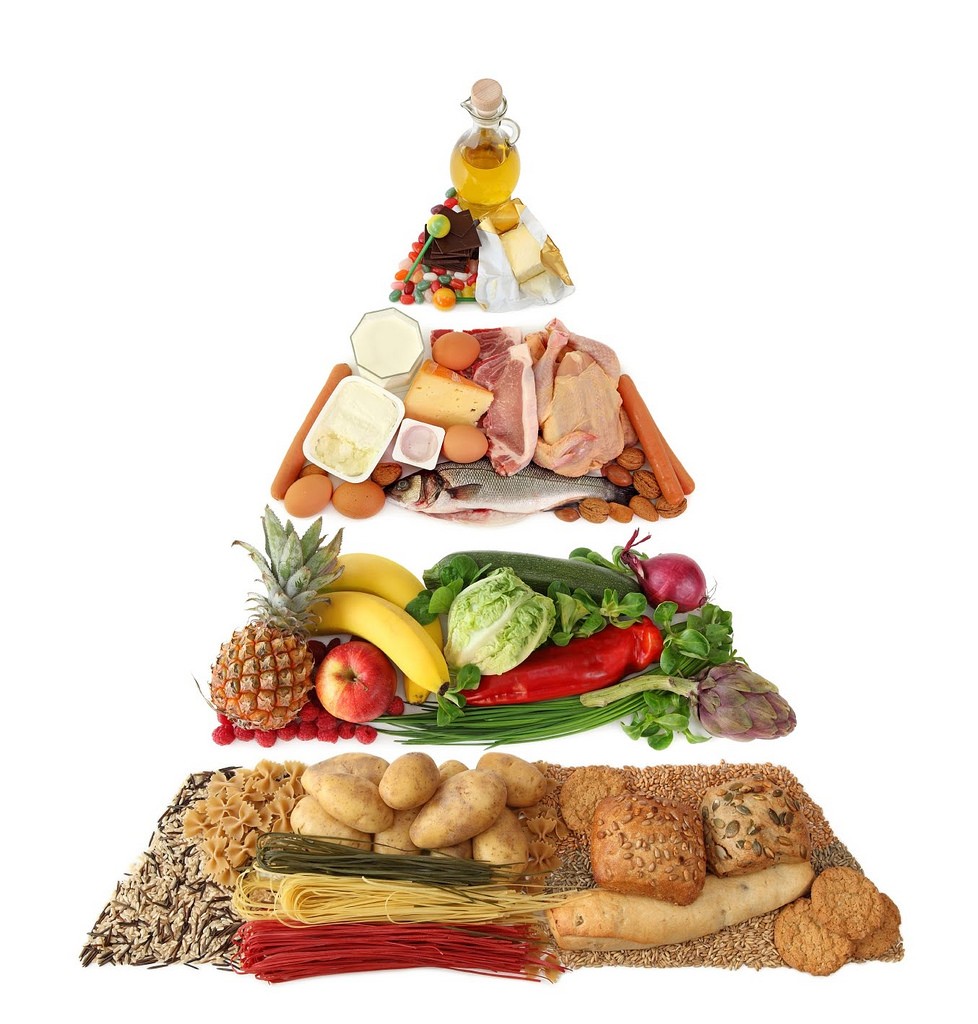Take a walk through a typical grocery store and you will see the shelves stocked with edibles boasting “low fat”, “fat free”, or “heart healthy-no fat”! This low-fat diet trend was widely popularized in the late 1980s and early 1990s so much so that government run nutrition programs also became great advocates. Removing fat from the diet was supposedly going to prevent heart disease, help individuals lose weight, and provide a plethora of other health benefits. People stood behind this idea so much that it was used to construct what many of us will recognize as the food pyramid we studied in elementary school.
As the diagram shows, the food group with the largest allotted intake is carbohydrates. It makes sense that when all fats are removed from the diet, carbohydrates would be the natural default to fill that void, but is that really the healthiest option? Twenty years later, research would say “no”. Studies have shown that a high-carb, low-fat diet does not reduce the occurrence of heart attacks and strokes, and heart disease as a whole is still just as much a problem as it was back in the early 90s. Not only does a high-carb diet have no benefit to the reduction of heart disease, it also has a negative effect on blood cholesterol levels.
This brings us back to fat, which for decades has been seen as the enemy of the food world. Fat does not make you fat. Yes, it is hard to believe, but that is only because we have been trained to think otherwise. Consumed reasonably and responsibly, fat is only stored as access when the body is unable to burn it. This is often a hormonal issue that is naturally regulated by leptin, a hormone secreted by fat. Therefore, fat is necessary to burn fat.
Here are some quick, hard facts about fat and its role in the body:
1. The body burns fat to use as energy. When exercising, the body will use energy by metabolizing carbohydrates for approximately the first 20 minutes. After that, all energy comes from fat calories.
2. Fat also helps the body to absorb essential vitamins like vitamins A, D, E, and K.
3. Every cell in the body is protected and held together by a membrane that is composed of fats called phospholipids. Fat provides nutrients that the body uses to build these membranes.
4. Essential fatty acids, linoleic and linolenic acid, are fats that the body cannot make itself but needs for brain development and regulating inflammatory responses. These functions are most obviously seen in fat’s role of building hormones and making up nearly 70% of brain tissue.
5. All vital organs are cushioned by fat and your temperature is regulated partially by the insulation that fat provides.
Some fats are good and actually necessary for a well-rounded diet and proper body functioning, but it is important to learn to differentiate between those that are beneficial and those that are harmful.
Identifying which fats are beneficial begins with the discussion of healthy fats versus damaged fats. Healthy fats provide the body with the nutrients that it needs to perform all of the functions listed above. Damaged fats are those that undergo chemical change as they are metabolized and assimilated in your body or while they are being manufactured, like in the case of trans fats. The body does not recognize damaged fats which makes them unable to be removed as the body detoxifies, contributing to weight gain. Damaged fats also adhere to arterial walls, causing inflammation, blockage, and heart disease.
From a dietary perspective, healthy fats include olive oil, avocados, nuts, seeds, coconuts, and fats that come from naturally raised animals. Damaged fats include trans fats (hydrogenated oils), some vegetable oils like corn and soybean oil where extraction from the vegetable causes rancidity, and canola oil. Canola oil is a special case because although it is very low in saturated fat, it is entirely manmade. There is no such thing as a canola plant. It is a genetic manipulation of rapeseed oil where beneficial omega-3 fats are denatured, causing rancidity.
With this information in mind, it is best to emphasize moderation with intake. Reduce refined carbohydrates and remember that some fat is good for you. Even a small amount of saturated fat in the diet has proven to be beneficial as exampled by the eating habits of French and other Mediterranean populations. Ultra-low fat diets leave the body hungry and craving nutrients, often causing increased consumption. This is easily combatted by introducing the right kinds of fat into the diet. Here’s your opportunity to nourish yourself and take advantage of the benefits of fat.
Sources:

